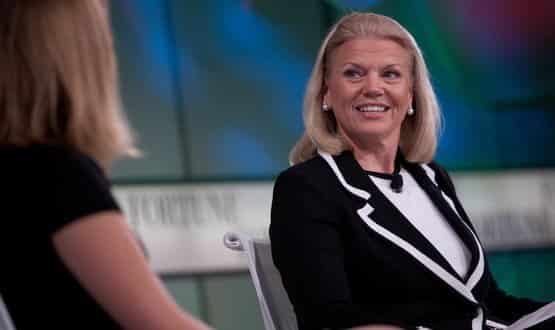IBM’s CEO says AI will unlock golden era for health

Ginni Rometti, the CEO of IBM, called on health IT leaders to go on the offensive and embrace the potential of cognitive computing to achieve transformational change in areas including, but not limited to, precision medicine, population health management, genomics, diagnosis and clinical decision making.
She described cognitive computing as offering the potential to open up a new “golden age” in healthcare, but acknowledged much had to be done to allay people’s concerns about privacy, transparency and artificial intelligence costing them their jobs.
In her opening keynote at HIMSS 2017 conference in Orlando on Monday, Rometti, said: “I feel this is a profoundly hopeful time.” She added: “I hope to persuade you that cognitive healthcare is real and here and can change almost everything about healthcare”.
Describing IBM’s multi-billion investment in Watson cognitive computing as “our next moonshot”, she said, “I’d never be so arrogant as to say we can do all of it but working with partners we can and are now helping change parts of healthcare. I think we can transform many parts of healthcare, whether its epidemiology or personalised healthcare.”.
“Digital is foundation to everything. But competitive advantage will come from cognitive. And there is a land rush on AI at the moment.” She urged delegates to think about scalable platform investments rather than piecemeal investments.
Rometti, regularly voted one of the most influential women in the business world, became CEO of IBM five years ago, the same year that Watson famously won US quiz show Jeopardy, capturing the public imagination on AI development.
Health has been a major focus for Watson ever since, with a raft of pilots and initiatives. In 2014 IBM launched Watson Health, which now has over 7,000 employees.
Rometti offered five lessons on developing AI for healthcare, based on IBM’s experience to date.
First, is about using a range of services. “Those who are successful apply a range of cognitive services – you need many elements to successfully deliver services.”
Second is the need to provide transparency on who provide the training for the AI. “Knowing who trained and what data is used is essential to have confidence in insights. This is an industry that is full of professionals who want to understand how did that answer come up.”
Third, training must be domain specific – “so for health it must trained by physicians.”
Fourth, it must be cloud based. “It will need to be cloud based to be ubiquitous, built for scaling and security.”
Fifth, “it has to be an open platform. This is an industry all about innovation.”
She said that IBM has already worked with many partners internationally and Watson Health includes 300m medical records and 30 billion images.
Examples of applications have included in oncology, and embedding cognition into EMRs and genomics data. “Cognition means that precision medicine is coming alive,” said Rometti.
“We already serve in 50 human health and services internationally and analyse 44% of all Medicaid cases today,” she added.
“So cognitive computing is at the beginning in healthcare but it is already starting to happen.”
One key to an open platform is that it must also enable users to “Have control of insights that come out of that data. You can combine data but insights are yours.”
Rometti predicted the cognitive computing era would give rise to a new category of ‘new collar’ jobs and that Watson was not there to replace doctors or nurses. “We are here to augment what man does. For a doctor this is his aid or colleague. This is not about fear.”
She urged health IT leaders to be bold.” If I could offer you one piece of advice it would be: don’t be tentative, it is a time to play offence.”



